Citrus Concentrate Market
Citrus Concentrate Market Size and Share Forecast Outlook 2025 to 2035
Citrus concentrate market is projected to grow from USD 9.6 billion in 2025 to USD 14.3 billion by 2035, at a CAGR of 4.1%. Orange will dominate with a 65.0% market share, while beverages will lead the application segment with a 60.0% share.
Citrus Concentrate Market Forecast and Outlook 2025 to 2035
The global citrus concentrate market is projected to grow from USD 9.6 billion in 2025 to approximately USD 14.2 billion by 2035, recording an absolute increase of USD 4.6 billion over the forecast period. This translates into a total growth of 47.9%, with the market forecast to expand at a compound annual growth rate (CAGR) of 4.1% between 2025 and 2035.
The overall market size is expected to grow by nearly 1.5X during the same period, supported by increasing demand for natural fruit ingredients, rising adoption in beverage and food applications, and increasing focus on advanced citrus processing technologies across the global food processing and beverage sectors.
Quick Stats for Citrus Concentrate Market
- Citrus Concentrate Market Value (2025): USD 9.6 billion
- Citrus Concentrate Market Forecast Value (2035): USD 14.2 billion
- Citrus Concentrate Market Forecast CAGR: 4.1%
- Leading Fruit Type in Citrus Concentrate Market: Orange (65%)
- Key Growth Regions in Citrus Concentrate Market: Asia Pacific, North America, and Europe
- Key Players in Citrus Concentrate Market: Citrosuco, Cutrale, Louis Dreyfus, Citromax, Citrusvil, Prodalim, Döhler, Peace River
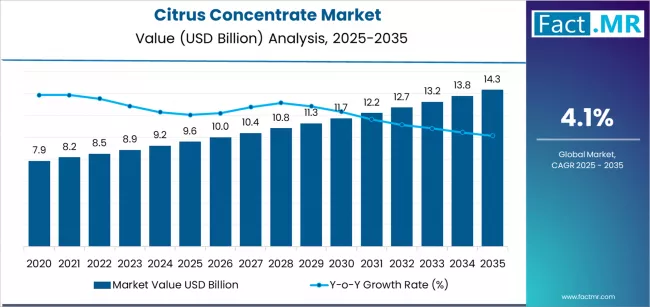
Between 2025 and 2030, the citrus concentrate market is projected to expand from USD 9.6 billion to USD 11.7 billion, resulting in a value increase of USD 2.1 billion, which represents 45.7% of the total forecast growth for the decade. This phase of development will be shaped by rising demand for natural ingredient technologies, increasing applications in beverage optimization, and growing penetration in emerging food processing markets. Food and beverage manufacturers are expanding their citrus concentrate capabilities to address the growing demand for advanced natural ingredient systems in various food applications and beverage processes.
Citrus Concentrate Market Key Takeaways
| Metric | Value |
|---|---|
| Estimated Value in (2025E) | USD 9.6 billion |
| Forecast Value in (2035F) | USD 14.2 billion |
| Forecast CAGR (2025 to 2035) | 4.1% |
From 2030 to 2035, the market is forecast to grow from USD 11.7 billion to USD 14.2 billion, adding another USD 2.5 billion, which constitutes 54.3% of the overall ten-year expansion. This period is expected to be characterized by the expansion of advanced food processing facilities, the integration of cutting-edge citrus processing technologies, and the development of customized concentrate systems for specific food and beverage applications. The growing adoption of natural ingredient standards and processing requirements will drive demand for ultra-high efficiency citrus concentrate systems with enhanced performance specifications and consistent flavor characteristics.
Between 2020 and 2025, the citrus concentrate market experienced steady expansion, driven by increasing recognition of natural ingredient technologies' importance in food processing operations and growing acceptance of advanced citrus solutions in complex food manufacturing processes. The market developed as manufacturers recognized the need for high-efficiency citrus processing systems to address flavor quality requirements and improve overall product outcomes. Research and development activities have begun to emphasize the importance of advanced citrus concentrate technologies in achieving better efficiency and quality in food processing operations.
Why is the Citrus Concentrate Market Growing?
Market expansion is being supported by the increasing demand for natural fruit ingredient solutions and the corresponding need for high-efficiency processing systems in citrus concentrate applications across global food and beverage operations. Modern manufacturers are increasingly focused on advanced citrus processing technologies that can improve production efficiency, reduce processing costs, and enhance product quality while meeting stringent food safety requirements. The proven efficacy of citrus concentrate products in various food applications makes them an essential component of comprehensive food processing strategies and flavor enhancement programs.
The growing emphasis on food industry transformation and advanced flavor optimization is driving demand for ultra-efficient citrus processing systems that meet stringent performance specifications and safety requirements for beverage and food applications. Manufacturers' preference for reliable, high-performance citrus processing systems that can ensure consistent flavor outcomes is creating opportunities for innovative citrus concentrate technologies and customized food solutions. The rising influence of natural ingredient guidelines and quality protocols is also contributing to increased adoption of premium-grade citrus processing systems across different food applications and processing systems requiring advanced citrus concentrate technology.
Opportunity Pathways - Citrus Concentrate Market
The citrus concentrate market represents a specialized growth opportunity, expanding from USD 9.6 billion in 2025 to USD 14.2 billion by 2035 at a 4.1% CAGR. As manufacturers prioritize processing efficiency, food safety compliance, and flavor quality performance in complex food formulation processes, citrus concentrate systems have evolved from a niche food ingredient to an essential component enabling flavor delivery, processing optimization, and multi-stage food production across manufacturing operations and specialized beverage applications.
The convergence of food industry expansion, increasing natural ingredient adoption, specialized food organization growth, and quality requirements creates momentum in demand. High-efficiency formulations offering superior flavor performance, cost-effective orange systems balancing performance with economics, and specialized lemon variants for critical applications will capture market premiums, while geographic expansion into high-growth Asian food markets and emerging market penetration will drive volume leadership. Manufacturing emphasis on product quality and citrus reliability provides structural support.
- Pathway A - Orange Dominance: Leading with 65% market share, orange applications drive primary demand through complex food workflows requiring comprehensive citrus systems for flavor delivery. Advanced formulations enabling improved processing efficiency, reduced formulation complexity, and enhanced product quality command premium pricing from manufacturers requiring stringent performance specifications and food safety compliance. Expected revenue pool: USD 6.2-9.2 billion.
- Pathway B - Beverage Application Leadership: Dominating with 60.0% market share through an optimal balance of performance and cost-effectiveness, beverage applications serve most food manufacturing operations while meeting quality requirements. This application addresses both performance standards and economic considerations, making it the preferred choice for food and beverage operations seeking reliable performance. Opportunity: USD 5.8-8.5 billion.
- Pathway C - Asian Market Acceleration: China (5% CAGR) and India (6% CAGR) lead global growth through food infrastructure expansion, citrus processing capability development, and domestic concentrate demand. Strategic partnerships with local manufacturers, food safety compliance expertise, and supply chain localization enable the expansion of citrus technology in major food hubs. Geographic expansion upside: USD 2.5-4.0 billion.
- Pathway D - B2B Distribution Premium Segment: B2B distribution serves specialized requirements demanding exceptional performance specifications for critical food processes. B2B formulations supporting advanced processing requirements, complex food applications, and performance-sensitive processes command significant premiums from advanced food organizations and specialized processing facilities. Revenue potential: USD 7.7-11.4 billion.
- Pathway E - Advanced Processing & Technology Systems: Companies investing in sophisticated citrus concentrate technologies, processing systems, and automated production processes gain competitive advantages through consistent system performance and product quality reliability. Advanced capabilities enabling customized specifications and rapid deployment capture premium food manufacturing partnerships. Technology premium: USD 2.0-3.5 billion.
Segmental Analysis
The market is segmented by fruit type, application, distribution, and region. By fruit type, the market is divided into orange, lemon, lime, grapefruit, and others. Based on application, the market is categorized into beverages, bakery, confectionery, and others. By distribution, the market is divided into B2B and B2C. Regionally, the market is divided into Asia Pacific, North America, Europe, Latin America, Middle East & Africa.
By Fruit Type, Orange Segment Accounts for 65% Market Share
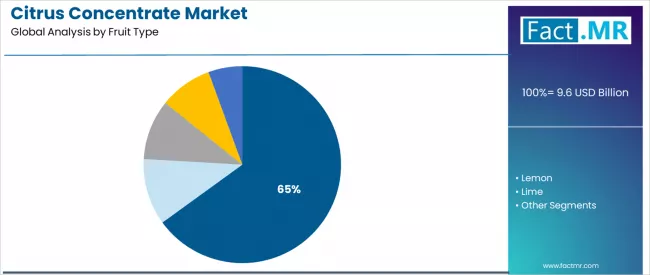
The orange segment is projected to account for 65% of the citrus concentrate market in 2025, reaffirming its position as the category's dominant fruit type. Manufacturers increasingly recognize the optimal balance of performance and cost-effectiveness offered by orange concentrate for most food applications, particularly in beverage delivery and food processing operations. This fruit type addresses both performance requirements and economic considerations while providing reliable flavor across diverse food applications.
This fruit category forms the foundation of most food protocols for beverage applications, as it represents the most widely accepted and commercially viable level of citrus concentrate technology in the industry. Performance control standards and extensive safety testing continue to strengthen confidence in orange formulations among food and beverage providers. With increasing recognition of the cost-performance optimization requirements in food processing, orange systems align with both operational efficiency and product quality goals, making them the central growth driver of comprehensive food processing strategies.
By Application, Beverages Segment Accounts for 60% Market Share
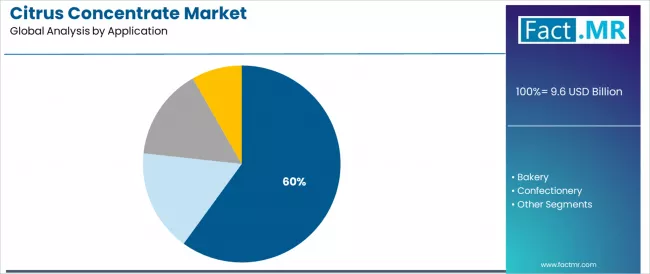
Beverage applications are projected to represent 60% of citrus concentrate demand in 2025, underscoring their role as the primary application segment driving market adoption and growth. Manufacturers recognize that beverage requirements, including complex flavor profiles, specialized processing needs, and multi-stage production systems, often require advanced citrus concentrate services that standard flavoring ingredients cannot adequately provide. Citrus concentrate offers enhanced processing efficiency and quality compliance in beverage applications.
The segment is supported by the growing nature of beverage adoption, requiring sophisticated citrus processing systems, and the increasing recognition that advanced citrus concentrate technologies can improve flavor performance and product outcomes. Additionally, manufacturers are increasingly adopting evidence-based quality guidelines that recommend specific citrus concentrate services for optimal beverage outcomes. As understanding of food complexity advances and quality requirements become more stringent, citrus concentrate will continue to play a crucial role in comprehensive food processing strategies within the beverage market.
What are the Drivers, Restraints, and Key Trends of the Citrus Concentrate Market?
The citrus concentrate market is advancing steadily due to increasing recognition of natural ingredient technologies' importance and growing demand for high-efficiency citrus processing systems across the food and beverage sectors. However, the market faces challenges, including complex supply chain requirements, potential for quality variations during processing and storage, and concerns about supply chain consistency for specialized citrus products. Innovation in citrus concentrate technologies and customized food protocols continues to influence product development and market expansion patterns.
Expansion of Advanced Food Processing Facilities and Citrus Technologies
The growing adoption of advanced food processing facilities is enabling the development of more sophisticated citrus concentrate production and performance control systems that can meet stringent food safety requirements. Specialized food facilities offer comprehensive citrus processing services, including advanced concentration and quality enhancement processes that are particularly important for achieving high-efficiency requirements in food applications. Advanced processing channels provide access to premium services that can optimize food performance and reduce processing costs while maintaining cost-effectiveness for large-scale food operations.
Integration of Digital Food Systems and Processing Management Systems
Modern food organizations are incorporating digital technologies such as real-time performance monitoring, automated processing systems, and supply chain integration to enhance citrus concentrate processing and distribution processes. These technologies improve product performance, enable continuous quality monitoring, and provide better coordination between manufacturers and customers throughout the production cycle. Advanced digital platforms also enable customized performance specifications and early identification of potential product deviations or supply disruptions, supporting reliable food production.
Analysis of the Citrus Concentrate Market by Key Country
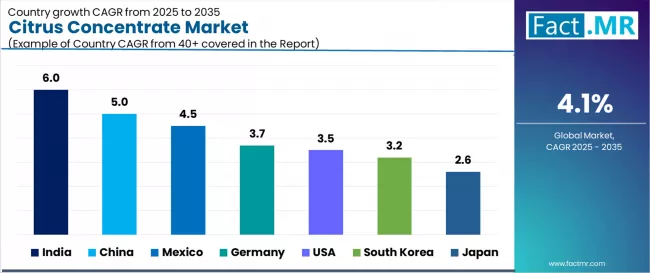
| Country | CAGR (2025-2035) |
|---|---|
| India | 6% |
| China | 5% |
| Mexico | 4.5% |
| Germany | 3.7% |
| USA | 3.5% |
| South Korea | 3.2% |
| Japan | 2.6% |
The citrus concentrate market is experiencing varied growth globally, with India leading at a 6% CAGR through 2035, driven by the expansion of food infrastructure development, increasing citrus processing capabilities, and growing domestic demand for high-efficiency concentrate systems. China follows at 5%, supported by food industry expansion, growing recognition of advanced citrus technology importance, and expanding production capacity. Mexico records 4.5% growth, with a focus on developing the food processing and beverage industries. Germany shows 3.7% growth, representing a mature market with established processing patterns and food safety frameworks. USA demonstrates 3.5% growth, emphasizing food infrastructure expansion and systematic processing approaches. South Korea exhibits 3.2% growth with focus on beverage applications, while Japan demonstrates 2.6% growth, emphasizing product quality and precision processing approaches.
India Demonstrates Growing Market Potential with Food Infrastructure Development
Revenue from citrus concentrate in India is projected to exhibit robust growth with a CAGR of 6% through 2035, driven by ongoing food industry expansion and increasing recognition of high-efficiency citrus processing systems as essential production components for complex food manufacturing processes. The country's expanding food infrastructure and growing availability of specialized citrus processing capabilities are creating significant opportunities for concentrate adoption across both domestic and export-oriented food facilities. Major international and domestic food companies are establishing comprehensive production and distribution networks to serve the growing population of manufacturers and processing facilities requiring high-performance citrus concentrate systems across beverage and food applications throughout India's major food hubs.
The Indian government's strategic emphasis on food processing modernization and manufacturing advancement is driving substantial investments in specialized citrus processing capabilities. This policy support, combined with the country's large domestic food market and expanding processing requirements, creates a favorable environment for the citrus concentrate market development. Indian manufacturers are increasingly focusing on high-value natural ingredients to improve processing capabilities, with citrus concentrate representing a key component in this food transformation.
- Government initiatives supporting food development and processing modernization are driving demand for high-efficiency citrus processing systems throughout major food and beverage centers, including major food processing regions across the country.
- Processing capacity expansion and citrus system development are supporting appropriate utilization of concentrate among manufacturers and processing facilities nationwide, with particular growth in beverage operations and food processing services.
China Demonstrates Exceptional Market Potential with Food Growth
Revenue from citrus concentrate in China is expanding at a CAGR of 5%, supported by increasing food accessibility, growing citrus processing awareness, and developing ingredient market presence across the country's major food clusters. The country's large food sector and increasing recognition of advanced citrus processing systems are driving demand for effective high-efficiency flavor solutions in both beverage and food applications. International food companies and domestic providers are establishing comprehensive distribution channels to serve the growing demand for quality citrus concentrate systems while supporting the country's position as an emerging food ingredient market.
China's food sector continues to benefit from favorable processing policies, expanding food capabilities, and cost-competitive infrastructure development. The country's focus on becoming a global food ingredient hub is driving investments in specialized citrus technology and food processing infrastructure. This development is particularly important for citrus concentrate applications, as manufacturers seek reliable domestic sources for critical food ingredients to reduce import dependency and improve supply chain security.
- Rising awareness about advanced food options and improving processing capabilities are creating opportunities for specialized citrus systems across food and beverage settings in major hubs like Beijing, Shanghai, and Guangzhou.
- Growing food infrastructure development and ingredient adoption are supporting increased access to high-efficiency citrus concentrate among manufacturers requiring comprehensive processing capabilities, particularly in food processing and beverage organizations.
Mexico Maintains Regional Leadership Position
Mexico's expanding food market demonstrates strong processing infrastructure development with documented citrus concentrate effectiveness in food departments and processing centers through integration with existing food systems and processing infrastructure. The country leverages processing expertise in citrus technology and food systems integration to maintain a 4.5% CAGR through 2035. Processing centers, including major agricultural areas, showcase premium installations where citrus concentrate systems integrate with comprehensive food information systems and processing platforms to optimize production accuracy and operational workflow effectiveness.
Mexican manufacturers prioritize system reliability and food safety compliance in food development, creating demand for premium systems with advanced features, including quality validation and integration with Mexican food standards. The market benefits from established food industry infrastructure and a willingness to invest in advanced citrus processing technologies that provide long-term operational benefits and compliance with food regulations.
Germany Shows Strong European Leadership
Germany's market expansion benefits from diverse food demand, including processing modernization in major food regions, citrus development programs, and government food programs that increasingly incorporate concentrate solutions for flavor enhancement applications. The country maintains a 3.7% CAGR through 2035, driven by rising food awareness and increasing adoption of citrus benefits, including superior processing capabilities and reduced food complexity.
Market dynamics focus on cost-effective citrus solutions that balance advanced processing features with affordability considerations important to German manufacturers. Growing food infrastructure creates demand for modern citrus concentrate systems in new food facilities and processing equipment modernization projects.
Strategic Market Indicators:
- Food and beverage segments leading growth with focus on flavor enhancement and operational efficiency applications
- Regional food requirements are driving a diverse product portfolio from basic citrus systems to advanced processing platforms
- Import dependency challenges offset by potential local development partnerships with international citrus manufacturers
- Government food initiatives beginning to influence procurement standards and processing requirements
USA Maintains Technology Leadership
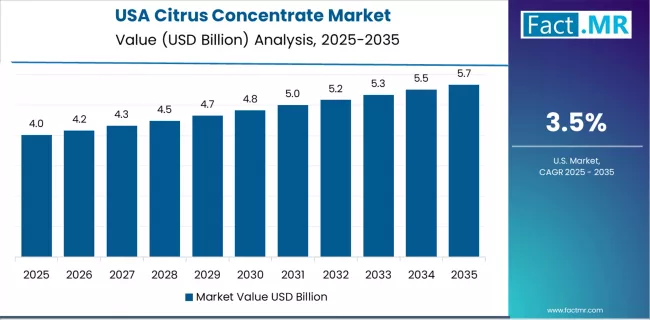
USA's advanced food market demonstrates sophisticated processing deployment with documented citrus concentrate effectiveness in food departments and processing centers through integration with existing food systems and processing infrastructure. The country leverages processing expertise in citrus technology and food systems integration to maintain a 3.5% CAGR through 2035. Food centers, including major metropolitan areas, showcase premium installations where citrus concentrate systems integrate with comprehensive food information systems and processing platforms to optimize food accuracy and operational workflow effectiveness.
American manufacturers prioritize system reliability and food safety compliance in food development, creating demand for premium systems with advanced features, including quality validation and integration with US food standards. The market benefits from established food industry infrastructure and a willingness to invest in advanced citrus technologies that provide long-term operational benefits and compliance with food regulations.
South Korea Emphasizes Innovation and Quality Excellence
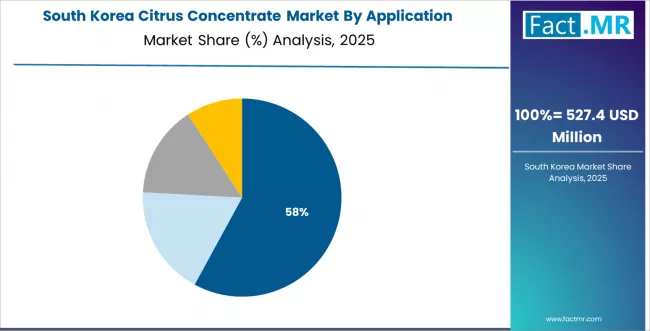
South Korea demonstrates steady market development with a 3.2% CAGR through 2035, distinguished by manufacturers' preference for high-quality citrus systems that integrate seamlessly with existing food equipment and provide reliable long-term processing benefits in specialized food applications. The market prioritizes advanced features, including precision processing algorithms, quality validation, and integration with comprehensive food platforms that reflect Korean food expectations for technological advancement and operational excellence.
Korean manufacturers focus on system reliability and precision in citrus development, creating demand for premium systems with advanced features including automated quality monitoring and comprehensive processing support. The market benefits from established food research infrastructure and investment in citrus technology that provides long-term food benefits.
Strategic Market Indicators:
- Premium focus on precision systems with advanced processing algorithms and high-reliability capabilities
- Integration requirements with existing food information systems and processing management platforms
- Emphasis on citrus reliability and long-term performance in food applications
- Strong preference for beverage applications accounting for 65% of demand versus bakery at 15%, confectionery at 10.0%, and others at 10.0%
Japan Emphasizes Precision and Integration Excellence
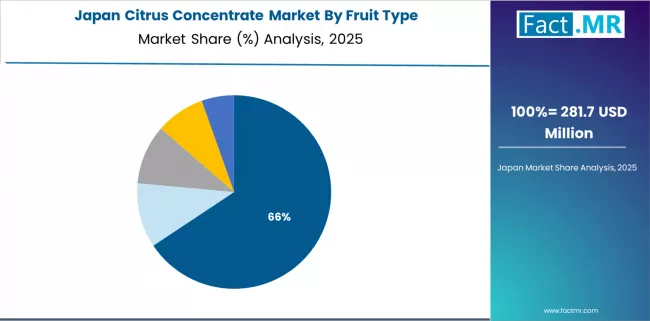
Japan demonstrates steady market development with a 2.6% CAGR through 2035, distinguished by manufacturers' preference for high-quality citrus systems that integrate seamlessly with existing food equipment and provide reliable long-term processing benefits in specialized food applications. The market prioritizes advanced features, including precision processing algorithms, quality validation, and integration with comprehensive food platforms that reflect Japanese food expectations for technological advancement and operational excellence.
Japanese manufacturers focus on system reliability and precision in citrus development, creating demand for premium systems with advanced features including automated quality monitoring and comprehensive processing support. The market benefits from established food research infrastructure and investment in citrus technology that provides long-term food benefits.
Strategic Market Indicators:
- Premium focus on precision systems with advanced processing algorithms and high-reliability capabilities
- Integration requirements with existing food information systems and food management platforms
- Emphasis on citrus reliability and long-term performance in food applications
- Balanced fruit type preferences with orange at 70.0%, lemon at 15%, lime at 10.0%, and grapefruit at 5%
Europe Market Split by Country
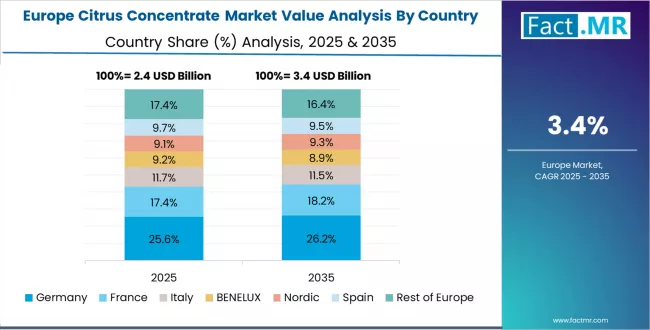
The citrus concentrate market in Europe is projected to grow from USD 9.6 billion in 2025 to USD 14.2 billion by 2035, registering a CAGR of 4.1% over the forecast period. Germany is expected to maintain its leadership position with USD 2.3 billion (24.0%) in 2025, supported by its advanced food processing infrastructure, precision citrus capabilities, and strong food manufacturing presence throughout major processing regions.
The United Kingdom follows with USD 1.63 billion (17.0%) in 2025, driven by advanced processing protocols, food innovation integration, and expanding specialty food networks serving both domestic and international markets. France holds USD 1.34 billion (14.0%) in 2025, supported by food infrastructure expansion and growing adoption of high-efficiency citrus concentrate systems. Italy commands USD 1.08 billion (11.3%) in 2025, while Spain accounts for USD 0.89 billion (9.3%) in 2025. The Rest of Europe region, including Nordic countries, Eastern Europe, and smaller Western European markets, is anticipated to hold USD 2.36 billion (24.4%) in 2025, reflecting diverse food processing capabilities and established food manufacturing frameworks across the region.
Competitive Landscape of the Citrus Concentrate Market
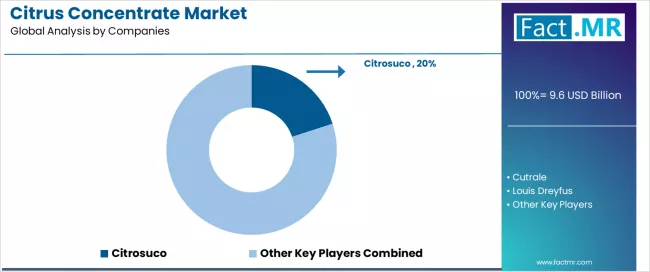
The citrus concentrate market is characterized by competition among established citrus processing companies, specialty ingredient providers, and food processing suppliers focused on delivering high-efficiency, consistent, and reliable citrus concentrate systems. Companies are investing in citrus technology advancement, performance control enhancement, strategic partnerships, and customer technical support to deliver effective, efficient, and reliable citrus solutions that meet stringent food safety and quality requirements. Processing optimization, performance validation protocols, and supply chain strategies are central to strengthening product portfolios and market presence.
Citrosuco leads the market with comprehensive high-efficiency citrus concentrate system offerings with a focus on performance consistency and quality reliability for food applications. Cutrale provides specialized citrus systems with emphasis on food processing applications and comprehensive technical support services. Louis Dreyfus focuses on advanced citrus technologies and customized food solutions for concentrate systems serving global markets. Citromax delivers established food ingredient systems with strong performance control systems and customer service capabilities.
Citrusvil operates with a focus on bringing innovative citrus technologies to specialized food applications and emerging markets. Prodalim provides comprehensive food ingredient system portfolios, including advanced citrus concentrate capabilities, across multiple food applications and processing systems. Döhler specializes in customized citrus solutions and performance management systems for food systems with emphasis on quality compliance. Peace River provides reliable supply chain solutions and technical expertise to enhance market accessibility and customer access to essential citrus concentrate systems.
Key Players in the Citrus Concentrate Market
- Citrosuco
- Cutrale
- Louis Dreyfus
- Citromax
- Citrusvil
- Prodalim
- Döhler
- Peace River
- Coca-Cola (Minute Maid)
- Cargill
- ADM
- SunOpta
- Yantai North Andre
- Louis Dreyfus Commodities
- Sucocitrico
Scope of the Report
| Items | Values |
|---|---|
| Quantitative Units (2025) | USD 9.6 billion |
| Fruit Type | Orange, Lemon, Lime, Grapefruit, Others |
| Application | Beverages, Bakery, Confectionery, Others |
| Distribution | B2B, B2C |
| Regions Covered | Asia Pacific, North America, Europe, Latin America, Middle East & Africa |
| Countries Covered | China, USA, Germany, Japan, India, South Korea, Mexico and 40+ countries |
| Key Companies Profiled | Citrosuco, Cutrale, Louis Dreyfus, Citromax, Citrusvil, Prodalim, Döhler, and Peace River |
| Additional Attributes | Dollar sales by fruit type and application, regional demand trends, competitive landscape, manufacturer preferences for specific citrus concentrate systems, integration with specialty food supply chains, innovations in citrus technologies, performance monitoring, and food processing optimization |
Citrus Concentrate Market by Segments
-
Fruit Type :
- Orange
- Lemon
- Lime
- Grapefruit
- Others
-
Application :
- Beverages
- Bakery
- Confectionery
- Others
-
Distribution :
- B2B
- B2C
-
Region :
-
Asia Pacific
- China
- India
- Japan
- South Korea
- ASEAN
- Australia & New Zealand
- Rest of Asia Pacific
-
North America
- United States
- Canada
- Mexico
-
Europe
- Germany
- United Kingdom
- France
- Italy
- Spain
- Nordic
- BENELUX
- Rest of Europe
-
Latin America
- Brazil
- Argentina
- Chile
- Rest of Latin America
-
Middle East & Africa
- Kingdom of Saudi Arabia
- Other GCC Countries
- Turkey
- South Africa
- Other African Countries
- Rest of Middle East & Africa
-
Table of Content
- Executive Summary
- Global Market Outlook
- Demand to side Trends
- Supply to side Trends
- Technology Roadmap Analysis
- Analysis and Recommendations
- Market Overview
- Market Coverage / Taxonomy
- Market Definition / Scope / Limitations
- Market Background
- Market Dynamics
- Drivers
- Restraints
- Opportunity
- Trends
- Scenario Forecast
- Demand in Optimistic Scenario
- Demand in Likely Scenario
- Demand in Conservative Scenario
- Opportunity Map Analysis
- Product Life Cycle Analysis
- Supply Chain Analysis
- Investment Feasibility Matrix
- Value Chain Analysis
- PESTLE and Porter’s Analysis
- Regulatory Landscape
- Regional Parent Market Outlook
- Production and Consumption Statistics
- Import and Export Statistics
- Market Dynamics
- Global Market Analysis 2020 to 2024 and Forecast, 2025 to 2035
- Historical Market Size Value (USD Million) Analysis, 2020 to 2024
- Current and Future Market Size Value (USD Million) Projections, 2025 to 2035
- Y to o to Y Growth Trend Analysis
- Absolute $ Opportunity Analysis
- Global Market Pricing Analysis 2020 to 2024 and Forecast 2025 to 2035
- Global Market Analysis 2020 to 2024 and Forecast 2025 to 2035, By Fruit Type
- Introduction / Key Findings
- Historical Market Size Value (USD Million) Analysis By Fruit Type , 2020 to 2024
- Current and Future Market Size Value (USD Million) Analysis and Forecast By Fruit Type , 2025 to 2035
- Orange
- Lemon
- Lime
- Grapefruit
- Others
- Y to o to Y Growth Trend Analysis By Fruit Type , 2020 to 2024
- Absolute $ Opportunity Analysis By Fruit Type , 2025 to 2035
- Global Market Analysis 2020 to 2024 and Forecast 2025 to 2035, By Application
- Introduction / Key Findings
- Historical Market Size Value (USD Million) Analysis By Application, 2020 to 2024
- Current and Future Market Size Value (USD Million) Analysis and Forecast By Application, 2025 to 2035
- Beverages
- Bakery
- Confectionery
- Others
- Y to o to Y Growth Trend Analysis By Application, 2020 to 2024
- Absolute $ Opportunity Analysis By Application, 2025 to 2035
- Global Market Analysis 2020 to 2024 and Forecast 2025 to 2035, By Region
- Introduction
- Historical Market Size Value (USD Million) Analysis By Region, 2020 to 2024
- Current Market Size Value (USD Million) Analysis and Forecast By Region, 2025 to 2035
- North America
- Latin America
- Western Europe
- Eastern Europe
- East Asia
- South Asia and Pacific
- Middle East & Africa
- Market Attractiveness Analysis By Region
- North America Market Analysis 2020 to 2024 and Forecast 2025 to 2035, By Country
- Historical Market Size Value (USD Million) Trend Analysis By Market Taxonomy, 2020 to 2024
- Market Size Value (USD Million) Forecast By Market Taxonomy, 2025 to 2035
- By Country
- USA
- Canada
- Mexico
- By Fruit Type
- By Application
- By Country
- Market Attractiveness Analysis
- By Country
- By Fruit Type
- By Application
- Key Takeaways
- Latin America Market Analysis 2020 to 2024 and Forecast 2025 to 2035, By Country
- Historical Market Size Value (USD Million) Trend Analysis By Market Taxonomy, 2020 to 2024
- Market Size Value (USD Million) Forecast By Market Taxonomy, 2025 to 2035
- By Country
- Brazil
- Chile
- Rest of Latin America
- By Fruit Type
- By Application
- By Country
- Market Attractiveness Analysis
- By Country
- By Fruit Type
- By Application
- Key Takeaways
- Western Europe Market Analysis 2020 to 2024 and Forecast 2025 to 2035, By Country
- Historical Market Size Value (USD Million) Trend Analysis By Market Taxonomy, 2020 to 2024
- Market Size Value (USD Million) Forecast By Market Taxonomy, 2025 to 2035
- By Country
- Germany
- UK
- Italy
- Spain
- France
- Nordic
- BENELUX
- Rest of Western Europe
- By Fruit Type
- By Application
- By Country
- Market Attractiveness Analysis
- By Country
- By Fruit Type
- By Application
- Key Takeaways
- Eastern Europe Market Analysis 2020 to 2024 and Forecast 2025 to 2035, By Country
- Historical Market Size Value (USD Million) Trend Analysis By Market Taxonomy, 2020 to 2024
- Market Size Value (USD Million) Forecast By Market Taxonomy, 2025 to 2035
- By Country
- Russia
- Poland
- Hungary
- Balkan & Baltic
- Rest of Eastern Europe
- By Fruit Type
- By Application
- By Country
- Market Attractiveness Analysis
- By Country
- By Fruit Type
- By Application
- Key Takeaways
- East Asia Market Analysis 2020 to 2024 and Forecast 2025 to 2035, By Country
- Historical Market Size Value (USD Million) Trend Analysis By Market Taxonomy, 2020 to 2024
- Market Size Value (USD Million) Forecast By Market Taxonomy, 2025 to 2035
- By Country
- China
- Japan
- South Korea
- By Fruit Type
- By Application
- By Country
- Market Attractiveness Analysis
- By Country
- By Fruit Type
- By Application
- Key Takeaways
- South Asia and Pacific Market Analysis 2020 to 2024 and Forecast 2025 to 2035, By Country
- Historical Market Size Value (USD Million) Trend Analysis By Market Taxonomy, 2020 to 2024
- Market Size Value (USD Million) Forecast By Market Taxonomy, 2025 to 2035
- By Country
- India
- ASEAN
- Australia & New Zealand
- Rest of South Asia and Pacific
- By Fruit Type
- By Application
- By Country
- Market Attractiveness Analysis
- By Country
- By Fruit Type
- By Application
- Key Takeaways
- Middle East & Africa Market Analysis 2020 to 2024 and Forecast 2025 to 2035, By Country
- Historical Market Size Value (USD Million) Trend Analysis By Market Taxonomy, 2020 to 2024
- Market Size Value (USD Million) Forecast By Market Taxonomy, 2025 to 2035
- By Country
- Kingdom of Saudi Arabia
- Other GCC Countries
- Turkiye
- South Africa
- Other African Union
- Rest of Middle East & Africa
- By Fruit Type
- By Application
- By Country
- Market Attractiveness Analysis
- By Country
- By Fruit Type
- By Application
- Key Takeaways
- Key Countries Market Analysis
- USA
- Pricing Analysis
- Market Share Analysis, 2024
- By Fruit Type
- By Application
- Canada
- Pricing Analysis
- Market Share Analysis, 2024
- By Fruit Type
- By Application
- Mexico
- Pricing Analysis
- Market Share Analysis, 2024
- By Fruit Type
- By Application
- Brazil
- Pricing Analysis
- Market Share Analysis, 2024
- By Fruit Type
- By Application
- Chile
- Pricing Analysis
- Market Share Analysis, 2024
- By Fruit Type
- By Application
- Germany
- Pricing Analysis
- Market Share Analysis, 2024
- By Fruit Type
- By Application
- UK
- Pricing Analysis
- Market Share Analysis, 2024
- By Fruit Type
- By Application
- Italy
- Pricing Analysis
- Market Share Analysis, 2024
- By Fruit Type
- By Application
- Spain
- Pricing Analysis
- Market Share Analysis, 2024
- By Fruit Type
- By Application
- France
- Pricing Analysis
- Market Share Analysis, 2024
- By Fruit Type
- By Application
- India
- Pricing Analysis
- Market Share Analysis, 2024
- By Fruit Type
- By Application
- ASEAN
- Pricing Analysis
- Market Share Analysis, 2024
- By Fruit Type
- By Application
- Australia & New Zealand
- Pricing Analysis
- Market Share Analysis, 2024
- By Fruit Type
- By Application
- China
- Pricing Analysis
- Market Share Analysis, 2024
- By Fruit Type
- By Application
- Japan
- Pricing Analysis
- Market Share Analysis, 2024
- By Fruit Type
- By Application
- South Korea
- Pricing Analysis
- Market Share Analysis, 2024
- By Fruit Type
- By Application
- Russia
- Pricing Analysis
- Market Share Analysis, 2024
- By Fruit Type
- By Application
- Poland
- Pricing Analysis
- Market Share Analysis, 2024
- By Fruit Type
- By Application
- Hungary
- Pricing Analysis
- Market Share Analysis, 2024
- By Fruit Type
- By Application
- Kingdom of Saudi Arabia
- Pricing Analysis
- Market Share Analysis, 2024
- By Fruit Type
- By Application
- Turkiye
- Pricing Analysis
- Market Share Analysis, 2024
- By Fruit Type
- By Application
- South Africa
- Pricing Analysis
- Market Share Analysis, 2024
- By Fruit Type
- By Application
- USA
- Market Structure Analysis
- Competition Dashboard
- Competition Benchmarking
- Market Share Analysis of Top Players
- By Regional
- By Fruit Type
- By Application
- Competition Analysis
- Competition Deep Dive
- Citrosuco
- Overview
- Product Portfolio
- Profitability by Market Segments (Product/Age /Sales Channel/Region)
- Sales Footprint
- Strategy Overview
- Marketing Strategy
- Product Strategy
- Channel Strategy
- Cutrale
- Louis Dreyfus
- Citromax
- Citrusvil
- Prodalim
- Döhler
- Peace River
- Coca-Cola (Minute Maid)
- Cargill
- ADM
- SunOpta
- Yantai North Andre
- Louis Dreyfus Commodities
- Sucocitrico
- Citrosuco
- Competition Deep Dive
- Assumptions & Acronyms Used
- Research Methodology
List Of Table
- Table 1: Global Market Value (USD Million) Forecast by Region, 2020 to 2035
- Table 2: Global Market Value (USD Million) Forecast by Fruit Type , 2020 to 2035
- Table 3: Global Market Value (USD Million) Forecast by Application, 2020 to 2035
- Table 4: North America Market Value (USD Million) Forecast by Country, 2020 to 2035
- Table 5: North America Market Value (USD Million) Forecast by Fruit Type , 2020 to 2035
- Table 6: North America Market Value (USD Million) Forecast by Application, 2020 to 2035
- Table 7: Latin America Market Value (USD Million) Forecast by Country, 2020 to 2035
- Table 8: Latin America Market Value (USD Million) Forecast by Fruit Type , 2020 to 2035
- Table 9: Latin America Market Value (USD Million) Forecast by Application, 2020 to 2035
- Table 10: Western Europe Market Value (USD Million) Forecast by Country, 2020 to 2035
- Table 11: Western Europe Market Value (USD Million) Forecast by Fruit Type , 2020 to 2035
- Table 12: Western Europe Market Value (USD Million) Forecast by Application, 2020 to 2035
- Table 13: Eastern Europe Market Value (USD Million) Forecast by Country, 2020 to 2035
- Table 14: Eastern Europe Market Value (USD Million) Forecast by Fruit Type , 2020 to 2035
- Table 15: Eastern Europe Market Value (USD Million) Forecast by Application, 2020 to 2035
- Table 16: East Asia Market Value (USD Million) Forecast by Country, 2020 to 2035
- Table 17: East Asia Market Value (USD Million) Forecast by Fruit Type , 2020 to 2035
- Table 18: East Asia Market Value (USD Million) Forecast by Application, 2020 to 2035
- Table 19: South Asia and Pacific Market Value (USD Million) Forecast by Country, 2020 to 2035
- Table 20: South Asia and Pacific Market Value (USD Million) Forecast by Fruit Type , 2020 to 2035
- Table 21: South Asia and Pacific Market Value (USD Million) Forecast by Application, 2020 to 2035
- Table 22: Middle East & Africa Market Value (USD Million) Forecast by Country, 2020 to 2035
- Table 23: Middle East & Africa Market Value (USD Million) Forecast by Fruit Type , 2020 to 2035
- Table 24: Middle East & Africa Market Value (USD Million) Forecast by Application, 2020 to 2035
List Of Figures
- Figure 1: Global Market Pricing Analysis
- Figure 2: Global Market Value (USD Million) Forecast 2020-2035
- Figure 3: Global Market Value Share and BPS Analysis by Fruit Type , 2025 and 2035
- Figure 4: Global Market Y to o to Y Growth Comparison by Fruit Type , 2025-2035
- Figure 5: Global Market Attractiveness Analysis by Fruit Type
- Figure 6: Global Market Value Share and BPS Analysis by Application, 2025 and 2035
- Figure 7: Global Market Y to o to Y Growth Comparison by Application, 2025-2035
- Figure 8: Global Market Attractiveness Analysis by Application
- Figure 9: Global Market Value (USD Million) Share and BPS Analysis by Region, 2025 and 2035
- Figure 10: Global Market Y to o to Y Growth Comparison by Region, 2025-2035
- Figure 11: Global Market Attractiveness Analysis by Region
- Figure 12: North America Market Incremental Dollar Opportunity, 2025-2035
- Figure 13: Latin America Market Incremental Dollar Opportunity, 2025-2035
- Figure 14: Western Europe Market Incremental Dollar Opportunity, 2025-2035
- Figure 15: Eastern Europe Market Incremental Dollar Opportunity, 2025-2035
- Figure 16: East Asia Market Incremental Dollar Opportunity, 2025-2035
- Figure 17: South Asia and Pacific Market Incremental Dollar Opportunity, 2025-2035
- Figure 18: Middle East & Africa Market Incremental Dollar Opportunity, 2025-2035
- Figure 19: North America Market Value Share and BPS Analysis by Country, 2025 and 2035
- Figure 20: North America Market Value Share and BPS Analysis by Fruit Type , 2025 and 2035
- Figure 21: North America Market Y to o to Y Growth Comparison by Fruit Type , 2025-2035
- Figure 22: North America Market Attractiveness Analysis by Fruit Type
- Figure 23: North America Market Value Share and BPS Analysis by Application, 2025 and 2035
- Figure 24: North America Market Y to o to Y Growth Comparison by Application, 2025-2035
- Figure 25: North America Market Attractiveness Analysis by Application
- Figure 26: Latin America Market Value Share and BPS Analysis by Country, 2025 and 2035
- Figure 27: Latin America Market Value Share and BPS Analysis by Fruit Type , 2025 and 2035
- Figure 28: Latin America Market Y to o to Y Growth Comparison by Fruit Type , 2025-2035
- Figure 29: Latin America Market Attractiveness Analysis by Fruit Type
- Figure 30: Latin America Market Value Share and BPS Analysis by Application, 2025 and 2035
- Figure 31: Latin America Market Y to o to Y Growth Comparison by Application, 2025-2035
- Figure 32: Latin America Market Attractiveness Analysis by Application
- Figure 33: Western Europe Market Value Share and BPS Analysis by Country, 2025 and 2035
- Figure 34: Western Europe Market Value Share and BPS Analysis by Fruit Type , 2025 and 2035
- Figure 35: Western Europe Market Y to o to Y Growth Comparison by Fruit Type , 2025-2035
- Figure 36: Western Europe Market Attractiveness Analysis by Fruit Type
- Figure 37: Western Europe Market Value Share and BPS Analysis by Application, 2025 and 2035
- Figure 38: Western Europe Market Y to o to Y Growth Comparison by Application, 2025-2035
- Figure 39: Western Europe Market Attractiveness Analysis by Application
- Figure 40: Eastern Europe Market Value Share and BPS Analysis by Country, 2025 and 2035
- Figure 41: Eastern Europe Market Value Share and BPS Analysis by Fruit Type , 2025 and 2035
- Figure 42: Eastern Europe Market Y to o to Y Growth Comparison by Fruit Type , 2025-2035
- Figure 43: Eastern Europe Market Attractiveness Analysis by Fruit Type
- Figure 44: Eastern Europe Market Value Share and BPS Analysis by Application, 2025 and 2035
- Figure 45: Eastern Europe Market Y to o to Y Growth Comparison by Application, 2025-2035
- Figure 46: Eastern Europe Market Attractiveness Analysis by Application
- Figure 47: East Asia Market Value Share and BPS Analysis by Country, 2025 and 2035
- Figure 48: East Asia Market Value Share and BPS Analysis by Fruit Type , 2025 and 2035
- Figure 49: East Asia Market Y to o to Y Growth Comparison by Fruit Type , 2025-2035
- Figure 50: East Asia Market Attractiveness Analysis by Fruit Type
- Figure 51: East Asia Market Value Share and BPS Analysis by Application, 2025 and 2035
- Figure 52: East Asia Market Y to o to Y Growth Comparison by Application, 2025-2035
- Figure 53: East Asia Market Attractiveness Analysis by Application
- Figure 54: South Asia and Pacific Market Value Share and BPS Analysis by Country, 2025 and 2035
- Figure 55: South Asia and Pacific Market Value Share and BPS Analysis by Fruit Type , 2025 and 2035
- Figure 56: South Asia and Pacific Market Y to o to Y Growth Comparison by Fruit Type , 2025-2035
- Figure 57: South Asia and Pacific Market Attractiveness Analysis by Fruit Type
- Figure 58: South Asia and Pacific Market Value Share and BPS Analysis by Application, 2025 and 2035
- Figure 59: South Asia and Pacific Market Y to o to Y Growth Comparison by Application, 2025-2035
- Figure 60: South Asia and Pacific Market Attractiveness Analysis by Application
- Figure 61: Middle East & Africa Market Value Share and BPS Analysis by Country, 2025 and 2035
- Figure 62: Middle East & Africa Market Value Share and BPS Analysis by Fruit Type , 2025 and 2035
- Figure 63: Middle East & Africa Market Y to o to Y Growth Comparison by Fruit Type , 2025-2035
- Figure 64: Middle East & Africa Market Attractiveness Analysis by Fruit Type
- Figure 65: Middle East & Africa Market Value Share and BPS Analysis by Application, 2025 and 2035
- Figure 66: Middle East & Africa Market Y to o to Y Growth Comparison by Application, 2025-2035
- Figure 67: Middle East & Africa Market Attractiveness Analysis by Application
- Figure 68: Global Market - Tier Structure Analysis
- Figure 69: Global Market - Company Share Analysis
- FAQs -
How big is the citrus concentrate market in 2025?
The global citrus concentrate market is estimated to be valued at USD 9.6 billion in 2025.
What will be the size of citrus concentrate market in 2035?
The market size for the citrus concentrate market is projected to reach USD 14.3 billion by 2035.
How much will be the citrus concentrate market growth between 2025 and 2035?
The citrus concentrate market is expected to grow at a 4.1% CAGR between 2025 and 2035.
What are the key product types in the citrus concentrate market?
The key product types in citrus concentrate market are orange, lemon, lime, grapefruit and others.
Which application segment to contribute significant share in the citrus concentrate market in 2025?
In terms of application, beverages segment to command 60.0% share in the citrus concentrate market in 2025.